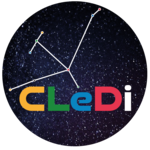Can you imagine being able to fly to any part of our universe at any time in history? Or navigate through galaxies, stars, nebulas, planets, asteroids and comets?
During the challenge, each project partner will be “located” in a different place of our Solar System (a planet, a satellite, a comet, etc.). Making use of astronomy concepts and of collaborative ICT tools, each working group will be asked to:
- Discover and understand where they are.
- Recognize constellations and mapping of the sky.
- Define characteristics of the place such as mass, habitability conditions, the existence or not of a protective atmosphere, etc.
- Define what they need to survive.
- Define when and how they can contact the rescue team.
As final result of the challenge, each group will be asked to prepare a digital product.
Ready for the CLeDi spacecraft challenge?
Click here to reach our Moodle and find all our materials as well as a space to work
or here to simply download the challenge kit
Astrophysicists involved
-
Dr. Aycin Aykutalp
From Ankara, Turkey. Currently working at Los Alamos National Laboratory. My research interests are focused on: seed black hole formation and their growth in the early universe, observations of active galactic nuclei at high redshift, origin of long gamma ray bursts, chemical and thermodynamical properties of star-forming gas clouds, reionization epoch, topology of space-time, nature of dark energy.
-
Dr. Paola Oliva
From 2010 to 2017 I studied galaxy formation and evolution, most of my work focused on galaxy spectroscopy (studies of metallicity and galaxy composition), galaxy dynamics and galaxy mergers (studies of the motions and interactions between galaxies). From 2017 onward I moved to the Artificial Intelligence space where I work with the social sector, and my current project focuses on the automatic classification of grant applications in Australia.
-
Dr. Johnson Urama
I am director of Astrophysics in the Department of Physics and Astronomy of the University of Nigeria, Nsukka. My research centers mostly on the rotational irregularities of radio pulsars (highly magnetized, rapidly rotating, neutron stars). I have also been involved in trying to unravel the body of traditional knowledge, especially as it concerns astronomy (ancient architecture, folklore, myths, religion, calendar), possessed by the different ethnic nationalities of Nigeria in particular, and Africa in general.
-
Dr. Isabel Perez
I am from Spain. I work at the University of Granada. My research interests are focused on the formation and evolution of galaxies from both the theoretical and observational point of view. I am interested in understanding the effect of internal and external effects in the evolution of spiral galaxies.
-
Msc. Elimboto Yohana
I am a Ph.D. student in Computational Cosmology (Applied Mathematics) at the University of KwaZulu-Natal in South Africa. I am employing the neutral hydrogen (HI) intensity mapping (IM) technique coupled with the baryonic acoustic oscillations (BAOs) to trace the underlying matter distribution over relatively large-scale structure of the universe, therefore constraining different physical models of the universe, such as dark energy and dark matter.
-
Dr. Karla Peña Ramírez
I am a colombian astronomer currently working next to the Atacama desert. I am interested in the understanding of the low mass population of our Galaxy. For this I study low mass stars, brown dwarfs and planets in open clusters in the near infrared.
-
Dr. Mirjana Povic
I am from Serbia. I work at the Ethiopian Space Science and Technology Institute (ESSTI) under the Astronomy and Astrophysics Research Division. I work on the formation and evolution of galaxies and the unclear activity in galaxies. To study these galaxies, I use planetary surveys such as the Advanced Large Homogeneous Area Medium-Band Redshift Astronomical (ALHAMBRA). I investigate the star formation rate and mass-metallicity relation in galaxies.
-
Msc. Jerusalem Tamirat
I am a staff member of Ethiopian Space Science and Research Technology Institute (ESSTI), Astronomy and Astrophysics Research and Development Department as an assistant researcher. I am also a Masters of Science(MSc) student in Astronomy and Astrophysics at ESSTI. As an assistant researcher I participate in different research projects mainly on cultural astronomy topics. My research interest is about Extra-Galactic Astronomy, and in particular in Active Galactic Nuclei (AGN).
-
Bsc. Leah Maryline
I am originally from Kenya. I am passionate about physics and Astrophysics. I have a degree of technology in technical and applied physics with a major in instrumentation and control. During my University I carried out a project on quasars. I am currently working on the Jupiter’s magnetosphere. I also have a diploma in software application. I participated in the DARA (Development for Africa with Radio Astronomy).

 This project has been funded with support from the European Commission. This website reflects the views only of the author, and the Commission cannot be held responsible for any use which may be made of the information contained therein.
This project has been funded with support from the European Commission. This website reflects the views only of the author, and the Commission cannot be held responsible for any use which may be made of the information contained therein.